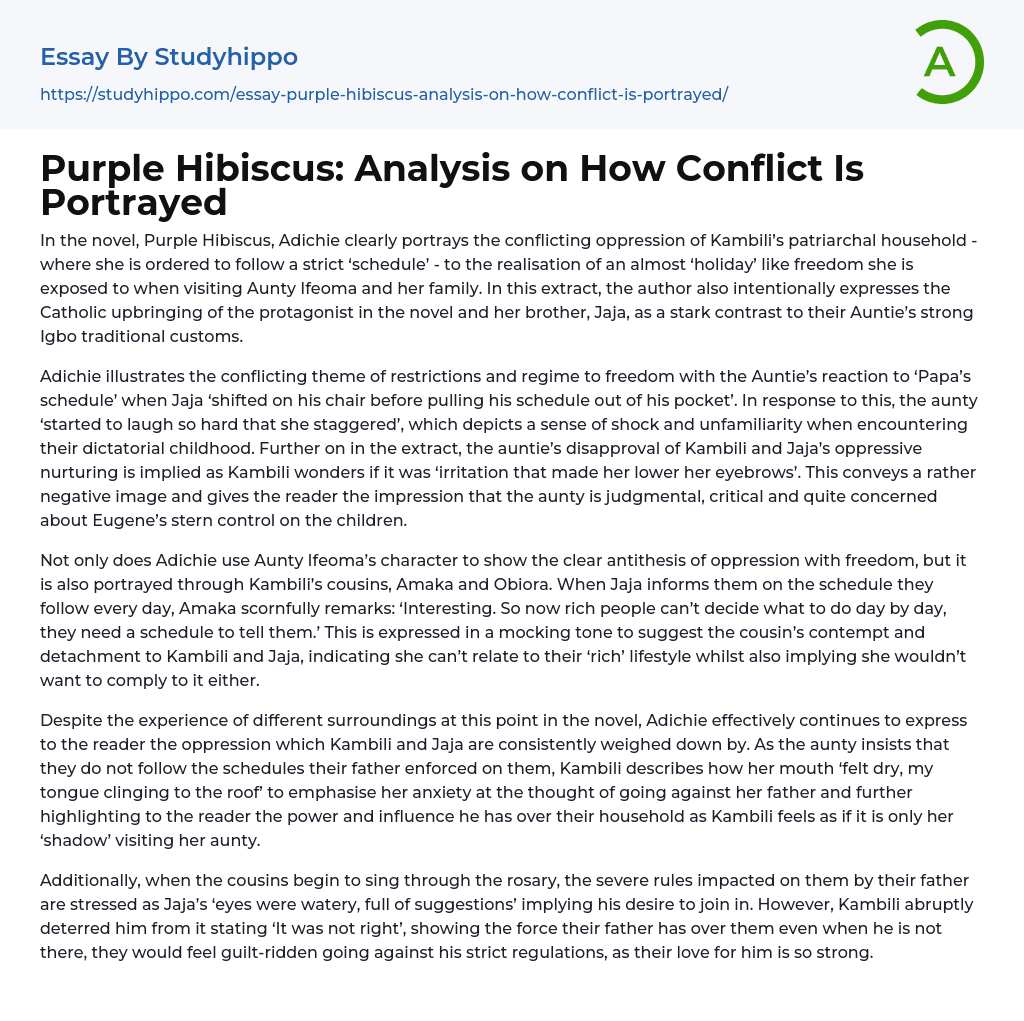

Purple Hibiscus: Analysis on How Conflict Is Portrayed Essay Example
In the novel, Purple Hibiscus, Adichie clearly portrays the conflicting oppression of Kambili’s patriarchal household - where she is ordered to follow a strict ‘schedule’ - to the realisation of an almost ‘holiday’ like freedom she is exposed to when visiting Aunty Ifeoma and her family. In this extract, the author also intentionally expresses the Catholic upbringing of the protagonist in the novel and her brother, Jaja, as a stark contrast to their Auntie’s strong Igbo traditional customs.
Adichie illustrates the conflicting theme of restrictions and regime to freedom with the Auntie’s reaction to ‘Papa’s schedule’ when Jaja ‘shifted on his chair before pulling his schedule out of his pocket’. In response to this, the aunty ‘started to laugh so hard that she staggered’, which depicts a sense of shock and unfamiliarit
...y when encountering their dictatorial childhood. Further on in the extract, the auntie’s disapproval of Kambili and Jaja’s oppressive nurturing is implied as Kambili wonders if it was ‘irritation that made her lower her eyebrows’. This conveys a rather negative image and gives the reader the impression that the aunty is judgmental, critical and quite concerned about Eugene’s stern control on the children.
Not only does Adichie use Aunty Ifeoma’s character to show the clear antithesis of oppression with freedom, but it is also portrayed through Kambili’s cousins, Amaka and Obiora. When Jaja informs them on the schedule they follow every day, Amaka scornfully remarks: ‘Interesting. So now rich people can’t decide what to do day by day, they need a schedule to tell them.’ This is expressed in a mocking tone to suggest the cousin’s contempt and detachment to
Kambili and Jaja, indicating she can’t relate to their ‘rich’ lifestyle whilst also implying she wouldn’t want to comply to it either.
Despite the experience of different surroundings at this point in the novel, Adichie effectively continues to express to the reader the oppression which Kambili and Jaja are consistently weighed down by. As the aunty insists that they do not follow the schedules their father enforced on them, Kambili describes how her mouth ‘felt dry, my tongue clinging to the roof’ to emphasise her anxiety at the thought of going against her father and further highlighting to the reader the power and influence he has over their household as Kambili feels as if it is only her ‘shadow’ visiting her aunty.
Additionally, when the cousins begin to sing through the rosary, the severe rules impacted on them by their father are stressed as Jaja’s ‘eyes were watery, full of suggestions’ implying his desire to join in. However, Kambili abruptly deterred him from it stating ‘It was not right’, showing the force their father has over them even when he is not there, they would feel guilt-ridden going against his strict regulations, as their love for him is so strong.
Contrastingly, Adichie purposefully stresses the sense of freedom that Kambili and Jaja are exposed to within the auntie’s household compared to their own dictatorship-ruled household. At the very beginning of this extract the aunty informs them of the lack of restrictions saying ‘you can stay up as long as you want afterward to watch TV or whatever else’, depicting her laid back approach and choice that is given to nurturing her own
children. This is further portrayed to the reader when Aunty Ifeoma describes their visit as a ‘holiday’, suggesting her care for them to enjoy their time and relax without the stress of a ‘schedule’ or routine which severely differs from their father’s intentions.
Furthermore, the author illustrates Kambili’s unfamiliarity of the Igbo customs when her cousin starts to sing in a ‘melodious voice’ after every decade and we are given a positive impression of Kambili’s narrative on the ‘uplifting’ Igbo songs, implying that the singing elevates her mood from repression. Through the simile: ‘like an opera singer drawing the words from the pit of her stomach’, Adichie emphasises the heartening essence of the Igbo traditions and freedom, illustrating them in an enriching way to stress the father’s conflicting views.
- Book Summary essays
- Metaphor essays
- Reader essays
- Rhyme essays
- Literary devices essays
- Villain essays
- Books essays
- Genre essays
- Literary Criticism essays
- Writer essays
- Protagonist essays
- Simile essays
- Poem essays
- Book Report essays
- Book Review essays
- Greek Mythology essays
- Plot essays
- Tragic Hero essays
- Coming of Age essays
- Play essays
- Rhetoric essays
- Rhetorical Question essays
- Translation essays
- Understanding essays
- Reason essays
- Character essays
- Letter essays
- American Literature essays
- Literature Review essays
- Utopia essays
- Poetry Analysis essays
- Dante's Inferno essays
- Between The World and Me essays
- Incidents in The Life of a Slave Girl essays
- Flowers for Algernon essays
- Myth essays
- Everyday Use essays
- Boo Radley essays
- Genesis essays
- Richard iii essays
- Alice in Wonderland essays
- On the road essays
- Ozymandias essays
- The Nightingale essays
- Holden Caulfield essays
- Animal Farm essays
- 1984 essays
- A Hanging essays
- Shooting An Elephant essays
- A Tale Of Two Cities essays



